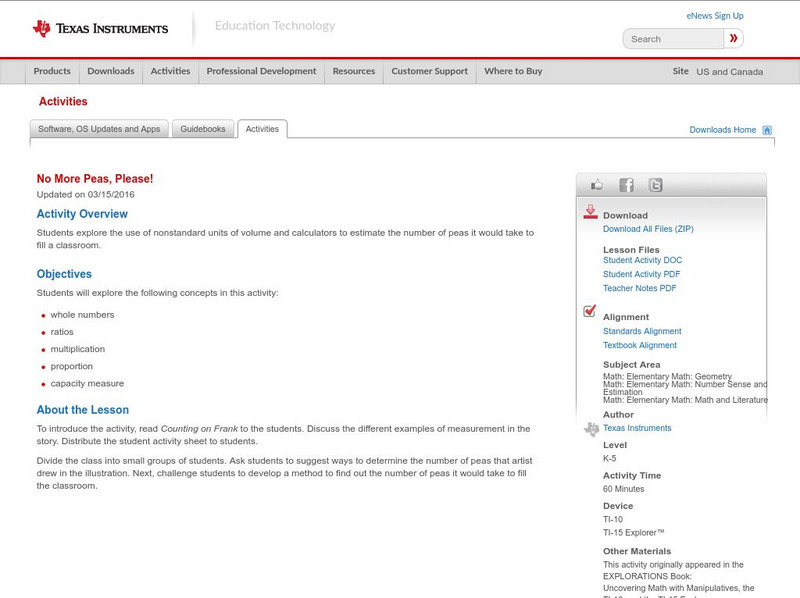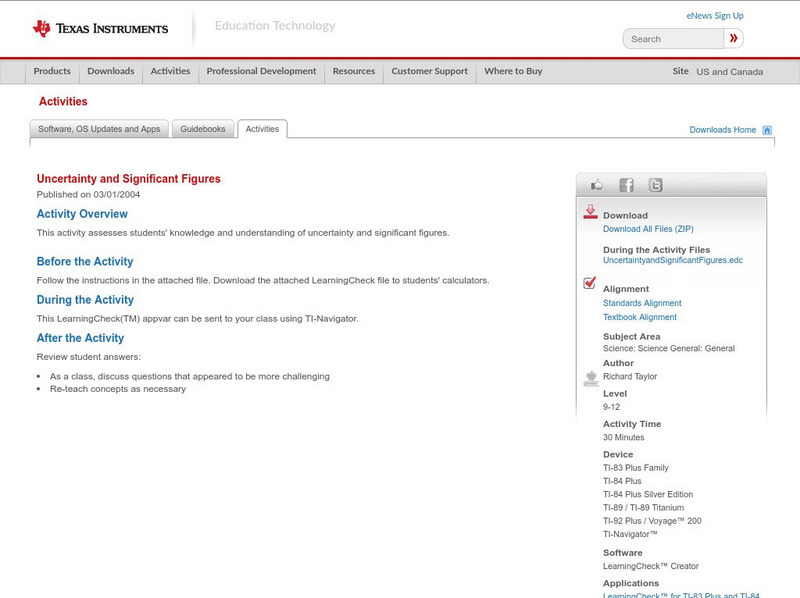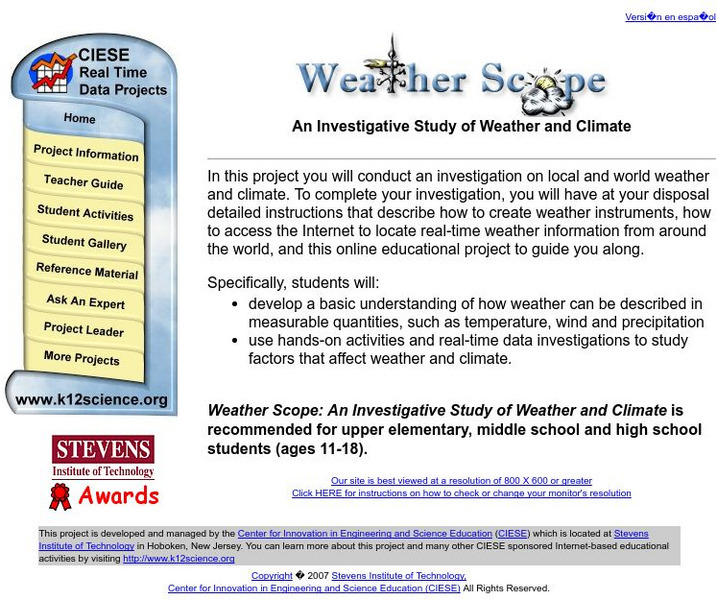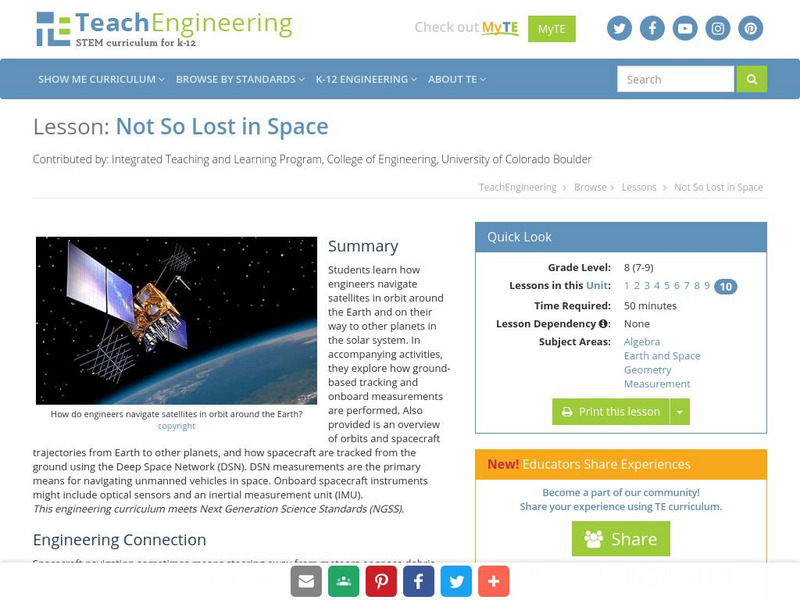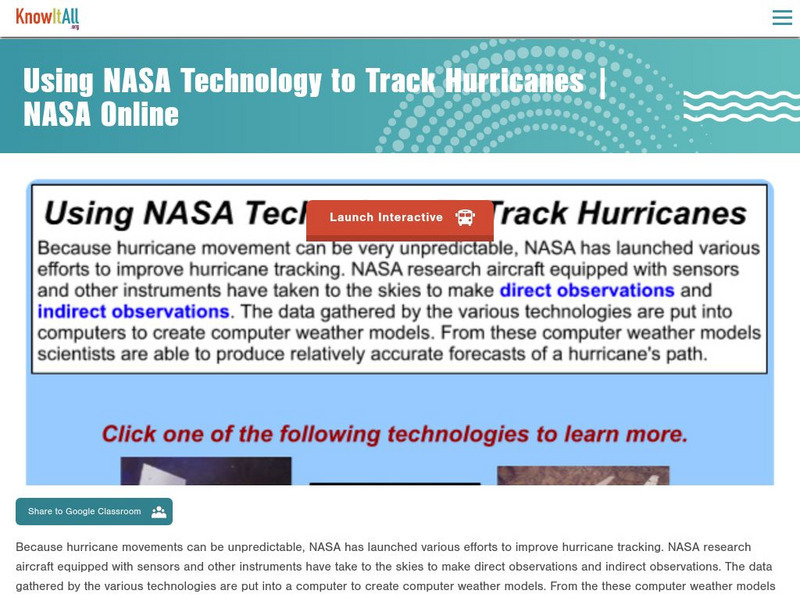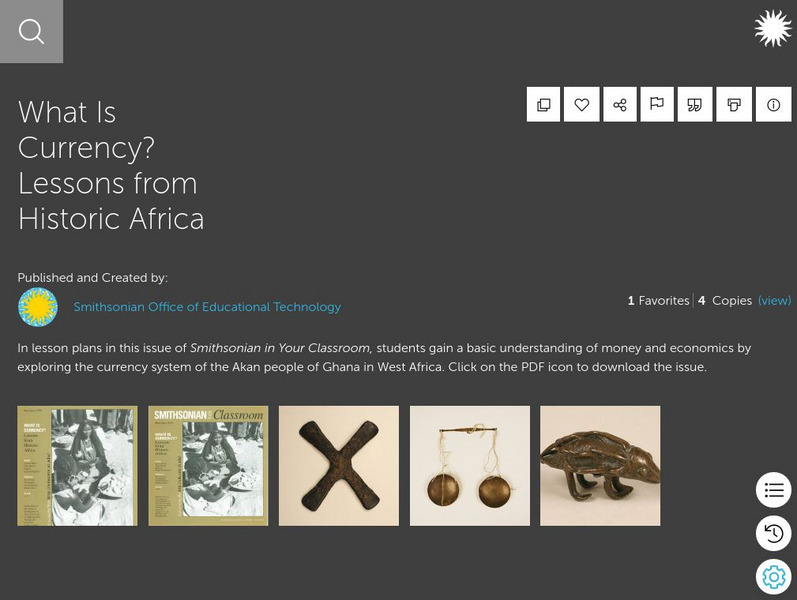Hi, what do you want to do?
Texas Instruments
Texas Instruments: No More Peas, Please!
In this activity, students explore the use of nonstandard units of volume and calculators to estimate the number of peas it would take to fill a class room.
Texas Instruments
Texas Instruments: Uncertainty and Significant Figures
This activity assesses students' knowledge and understanding of uncertainty and significant figures.
NASA
Nasa: Cobe: Cosmic Background Explorer
The Cosmic Background Explorer, or COBE, satellite began its space mission in November of 1989. Its task was to measure radiation levels from the early stages of the universe. This site explains the mission goals, COBE's specialized...
Other
Arizona Academic Standards & Accountability
Standards and learning outcomes are given for all content areas at this resource. In addition, instructional guides, performance standards, results and sample AIMS (Arizona Instrument to Measure Standards) tests are included.
TryEngineering
Try Engineering: Making Sense of Sensors
Lesson explore sensors focusing on ones that measure humidity. Young scholars work in teams to design, build, test, and evaluate a hygrometer which was made out of everyday materials to measure humidity levels.
NOAA
Noaa: Photo Library: Solar Powered Surface Automated Measurement (Sam) Site
The National Oceanic and Atmospheric Administration provides a photo library of severe weather formations and the instruments that measure them. Here you can find a photograph of a solar-powered Surface Automated Measurement (SAM) site....
Center for Innovation in Engineering and Science Education, Stevens Institute of Technology
Ciese Real Time Data Projects:collecting Weather Data and Keeping a Weather Log
Over a period of two weeks learners will use their class-made instruments to measure and record weather data. Students will also compare their data to online weather data. The final activity involves analyzing the collected data to look...
Center for Innovation in Engineering and Science Education, Stevens Institute of Technology
Ciese Real Time Data Projects: Weather Scope: A Study of Weather and Climate
Use real-time data to study factors that affect weather and climate, create weather instruments, and share data with students around the world.
Utah Education Network
Uen: Sun or Shade?
Use a thermometer to measure the air temperature in several places around the school.
University Corporation for Atmospheric Research
Ucar: Satellites and Weather Teaching Box
Help your middle school student learn how satellites help make weather forecasts more accurate and how the COSMIC satellites collect data about the atmosphere by measuring bending radio waves.
NASA
Nasa: Using Radiosonde Data From a Weather Balloon Launch
This lesson plan allows students to learn about the layers of the atmosphere and to learn how to graph real atmospheric data.
Center for Innovation in Engineering and Science Education, Stevens Institute of Technology
Ciese: Wonderful World of Weather Project
If you're studying the weather, this is an excellent project for students to develop their understanding of how weather is measured. They will use real time data from their location as well as from around the world to learn about weather...
TeachEngineering
Teach Engineering: Not So Lost in Space
Students learn how engineers navigate satellites in orbit around the Earth and on their way to other planets in the solar system. In accompanying activities, they explore how ground-based tracking and onboard measurements are performed....
Science Struck
Science Struck: What Is a Bolometer and What Is It Used For?
A bolometer is an instrument used to measure radiant energy. Learn about its history, its advantages, how it works, some different types, and its important applications.
NASA
Nasa: Climate Kids: Rainsticks and Folklore
From superstitions to satellites, find out how weather instruments have helped people predict drought conditions through time.
Famous Scientists
Famous Scientists: Arnold Orville Beckman
A short biography about Arnold Orville Beckman, once considered to have revolutionized the study of chemistry and biology with his work in bioscience instruments.
South Carolina Educational Television
Know It All Media: Tracking Hurricane Technology
Find out how scientists have improved hurricane tracking technology through new aircraft and advanced instruments.
National High Magnetic Field Laboratory
Magnet Academy: Galvanometer
This tutorial illustrates how a galvanometer, an instrument that detects and measures small amounts of current in an electrical circuit, works. (Java tutorial)
National High Magnetic Field Laboratory
Magnet Academy: Rheostat
After discovering the nature of electrical resistance, scientists devised instruments like this one to measure and control it. (Java tutorial)
CK-12 Foundation
Ck 12: Earth Science: Collecting Weather Data
[Free Registration/Login may be required to access all resource tools.] Describes the various instruments that scientists use to measure weather conditions, including advanced tools like satellites and radar.
American Museum of Natural History
American Museum of Natural History: O Logy: Stuff to Do: Make a Weather Station
Make a wind vane, rain gauge, and barometer and learn how to measure wind direction, rainfall, and air pressure.
Math Is Fun
Math Is Fun: Accuracy and Precision
The difference between accuracy and precision is explained, with a precautionary note about being aware of possible bias in the measuring instrument.
Other
Bellevue: Accuracy vs. Precision & Error vs. Uncertainty
A really nice distinction here in this longish piece from the Bellevue Community College. It's not just accuracy vs. precision, but also error vs. uncertainty. This is a necessary additional consideration for any paper on the topic.
Smithsonian Institution
Smithsonian Learning Lab: What Is Currency? Lessons From Historic Africa
From the Smithsonian, this site offers lessons and resources on currency, its use (in the form of gold dust, salt, or metal objects) as an instrument of trade in historic Africa, and its requirements as an instrument of trade in the...





